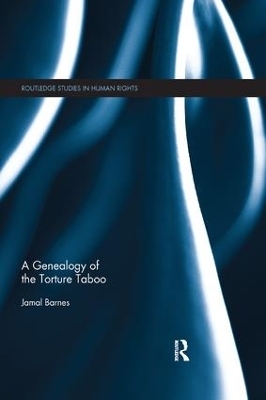
A Genealogy of the Torture Taboo
Seiten
2019
Routledge (Verlag)
978-0-367-22158-4 (ISBN)
Routledge (Verlag)
978-0-367-22158-4 (ISBN)
This book examines the historical genealogy of the torture taboo. The dissonance between the absolute prohibition against torture and its widespread violation raises important questions about the torture taboo in world politics. Does the torture taboo matter? Or are political realists correct in arguing that power politics rules?
Barnes argues that despite the torture taboo’s violation, it still matters, and paradoxically, its strength can be seen by studying its violation. States hide, deny, re-define and outsource their torture, as well as torture without leaving marks to avoid being stigmatised as a norm violating state. Tracing a genealogy of the torture taboo from the eighteenth to the twenty-first century Barnes shows how the taboo has developed over time, and how violations have played an important role in that development. Through six historical and contemporary case studies, it is argued that the taboo’s humanitarian pressures do not cease when states violate the norm, but continue to shape actors in unexpected ways.
Building upon the constructivist norm literature that has shown how norms shape state actions and interests, the book also widens our understanding of the complex role norm violations play in international society. Making a contribution to existing public debates on the use of torture in counter-terrorism policy, it will be of great use to scholars, postgraduates and practitioners in the fields of human rights, international relations theory (in particular constructivism), security studies and international law.
Barnes argues that despite the torture taboo’s violation, it still matters, and paradoxically, its strength can be seen by studying its violation. States hide, deny, re-define and outsource their torture, as well as torture without leaving marks to avoid being stigmatised as a norm violating state. Tracing a genealogy of the torture taboo from the eighteenth to the twenty-first century Barnes shows how the taboo has developed over time, and how violations have played an important role in that development. Through six historical and contemporary case studies, it is argued that the taboo’s humanitarian pressures do not cease when states violate the norm, but continue to shape actors in unexpected ways.
Building upon the constructivist norm literature that has shown how norms shape state actions and interests, the book also widens our understanding of the complex role norm violations play in international society. Making a contribution to existing public debates on the use of torture in counter-terrorism policy, it will be of great use to scholars, postgraduates and practitioners in the fields of human rights, international relations theory (in particular constructivism), security studies and international law.
Jamal Barnes is a Post-Doctoral Research Fellow in the School of Arts and Humanities, Edith Cowan University, Australia.
Introduction
Abolishing Torture
The Taboo and the Fear of Regression
The Nuremburg Trials and the Universal Declaration
Decolonisation and the UN Convention Against Torture
The Politics of the Definition of Torture
Torture and the "War on Terror"
Conclusion
| Erscheinungsdatum | 21.01.2019 |
|---|---|
| Reihe/Serie | Routledge Studies in Human Rights |
| Zusatzinfo | 13 Tables, black and white; 12 Line drawings, black and white; 12 Illustrations, black and white |
| Verlagsort | London |
| Sprache | englisch |
| Maße | 156 x 234 mm |
| Gewicht | 317 g |
| Themenwelt | Recht / Steuern ► EU / Internationales Recht |
| Recht / Steuern ► Öffentliches Recht ► Völkerrecht | |
| Sozialwissenschaften ► Politik / Verwaltung | |
| ISBN-10 | 0-367-22158-6 / 0367221586 |
| ISBN-13 | 978-0-367-22158-4 / 9780367221584 |
| Zustand | Neuware |
| Haben Sie eine Frage zum Produkt? |
Mehr entdecken
aus dem Bereich
aus dem Bereich


